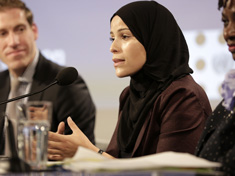-
To Be Young, Libyan, and Female: Alaa Murabit on Building Civil Society After Gaddafi
November 25, 2016 By Sean Peoples In the turbulent days following the 2011 fall of Colonel Muammar Gaddafi’s government, Dr. Alaa Murabit found herself in Libya’s fragile capital, Tripoli, observing exchanges between parliamentarians and civil society over the future of the country. For over 40 years, this kind of discussion was unthinkable – not the least, for a young woman.
In the turbulent days following the 2011 fall of Colonel Muammar Gaddafi’s government, Dr. Alaa Murabit found herself in Libya’s fragile capital, Tripoli, observing exchanges between parliamentarians and civil society over the future of the country. For over 40 years, this kind of discussion was unthinkable – not the least, for a young woman.In the turbulent days following the 2011 fall of Colonel Muammar Gaddafi’s government, Dr. Alaa Murabit found herself in Libya’s fragile capital, Tripoli, observing exchanges between parliamentarians and civil society over the future of the country. For over 40 years, this kind of discussion was unthinkable – not the least, for a young woman.
In this week’s podcast, Murabit, currently the United Nations high-level commissioner for health employment and economic growth, describes that delicate period and strategies for awakening and empowering a representative civil society, especially among young people.
To increase political participation of marginalized groups, Murabit started The Voice of Libyan Women at the age of 21 in August 2011. The organization was focused on economic empowerment and political participation of young women all over Libya, not just the capital or cities, she says.
At least 26 percent of the country’s population is between the ages of 10 and 24. Yet, Murabit argues that such a “youth bulge” is not the root of security problems. Rather, she argues the problem is relative deprivation, “where if I see that you have more and better than me, even though I have worked as hard and deserve as much, of course it’s going to create resentment.”
“A lot of my academic work is in securitization,” she explains. “When we talk now about youth, peace, and security, everybody talks about young men who they’re worried will pick up guns.” Meanwhile, those focused on women’s rights tend to focus on “older women who have influence networks, finances, and support.” The result is that young women are ignored by both youth and gender advocates.
Despite best intentions, the international community is sometimes guilty of contributing to this problem by characterizing youth as monolithic interest blocs. “If we’re going to be very genuine and organic about the inclusion of youth,” says Murabit, “we have to be talking about the spaces in which we’ve created.” If we do not create space for everyone, certain voices who should have a say in their country’s future are silenced.
Alaa Murabit spoke at the Wilson Center on October 6, 2016.
Friday Podcasts are also available for download on iTunes and Google Podcasts.
Topics: cooperation, democracy and governance, demography, development, Friday Podcasts, funding, gender, human rights, Libya, population, security, UN, youth
 A Publication of the Stimson Center.
A Publication of the Stimson Center.

 In the turbulent days following the 2011 fall of Colonel Muammar Gaddafi’s government, Dr. Alaa Murabit found herself in Libya’s fragile capital, Tripoli, observing exchanges between parliamentarians and civil society over the future of the country. For over 40 years, this kind of discussion was unthinkable – not the least, for a young woman.
In the turbulent days following the 2011 fall of Colonel Muammar Gaddafi’s government, Dr. Alaa Murabit found herself in Libya’s fragile capital, Tripoli, observing exchanges between parliamentarians and civil society over the future of the country. For over 40 years, this kind of discussion was unthinkable – not the least, for a young woman.

